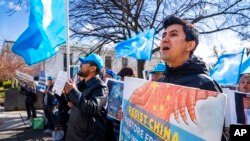Here's a summary of Uyghur-related news around the world from the past week:
Human rights groups urge US secretary of state to address China's abuses
Human rights organizations sent a joint letter to U.S. Secretary of State Antony Blinken, urging him to address China's human rights violations, particularly concerning the Uyghur population, ahead of his visit to Beijing.
The letter highlights recent instances of repression, including targeting Hui Muslims, imprisoning human rights lawyers and detaining individuals commemorating the Tiananmen massacre.
The groups call for a fresh approach and recommend supporting international investigations, releasing human rights defenders, seeking accountability for detained family members of U.S. citizens and promoting press freedom. Emphasizing the importance of prioritizing victims and ensuring justice, the letter underscores the need for action on China's human rights situation.
China opposes US inclusion of Chinese companies on Xinjiang abuse list
China has expressed strong opposition to the U.S. decision to include two additional Chinese companies on a list of entities accused of human rights abuses in Xinjiang.
The Chinese Commerce Ministry criticized the action, saying that it lacked factual basis and transparency. China vowed to take necessary measures to protect the legitimate rights and interests of Chinese enterprises.
The United States recently imposed an import ban on Ninestar Corp., a printer maker, and a Chinese chemical company.
AI tool flags Chinese products with ties to Uyghur forced labor on Temu
Tech firm Ultra has developed an AI-powered tool to identify products on the Chinese-owned digital marketplace Temu that may be linked to Uyghur forced labor in Xinjiang.
The AI tool analyzes shipping data to flag products connected to forced labor. The analysis discovered that products on Temu had nonindicative names and untraceable company information. However, when compared with the same products on China's Pinduoduo platform, they were traced back to companies in Xinjiang, located near Uyghur detention centers.
Ben Tzion, CEO of Ultra, suspects that Temu might be attempting to circumvent the Uyghur Forced Labor Prevention Act, and he emphasized the importance of accountability in such cases.
With over 50 million downloads, Temu ranks as the second most used digital marketplace in the U.S., following Amazon.
News in brief
The Chinese Embassy spokesperson in Washington has criticized a proposed U.S. bill that aims to expedite the asylum process for Uyghurs and has accused the United States of engaging in political manipulation under the pretext of human rights.
The bill, the Uyghur Human Rights Protection Act, was introduced by a bipartisan group in the House of Representatives and seeks to designate Uyghurs and other Muslim ethnic minorities in Xinjiang as priority refugees, facilitating their asylum applications in the United States. The legislation also aims to protect Uyghur refugees in other countries by urging diplomatic efforts to prevent their extradition back to China.
The U.S. government has recognized the treatment of Uyghurs as genocide, and representatives emphasized the urgent need to address the human rights emergency Uyghurs face.
The Chinese Embassy spokesperson dismissed the allegations as lies, while Uyghur advocates praised the bill for its protection of Uyghur rights and called for its passage.
Quote of note
“This [the Uyghur Human Rights Protection Act] is critical in safeguarding the rights of the Uyghur people, especially those at high risk of refoulement. Decreasing the risk of deportation brings huge hope to the diaspora community, especially those seeking asylum in the United States.”
- Dolkun Isa, president of the Munich-based World Uyghur Congress, to VOA




